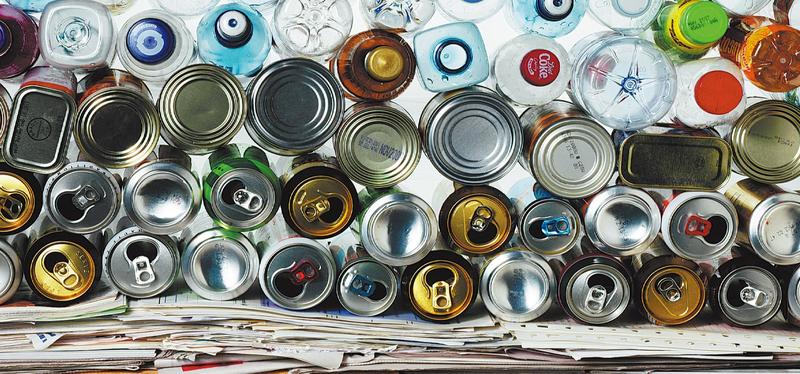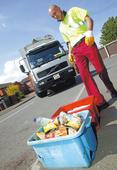 An artistic display of recyclable plastic bottles and cans. (PHOTO PROVIDED TO CHINA DAILY)
An artistic display of recyclable plastic bottles and cans. (PHOTO PROVIDED TO CHINA DAILY)
On a September morning last year in London's Borough Market, a group of nearly 200 volunteers donned aprons and sharpened their cooking skills to help feed people facing food poverty in the United Kingdom's capital and to prevent food waste.
The event, Wok for 1,000, was part of celebrity chef Jeremy Pang's work to support the charity Plan Zheroes, which aims to help connect food businesses with charities to redistribute surplus food and support measures to help prevent food waste.
Wasting less food doesn’t have to be complicated or timeconsuming. … It can be as simple as leaving the skin on (potatoes) when you make mash or freezing more food before it passes the ‘use by’ date
Helen White, special adviser for household food and drink at the Waste and Resources Action Programme
The event produced about 1,300 meals that were distributed across London for those in need.
Organizers hoped the event would raise awareness of food waste and food poverty.
Pang said he decided to act after learning about the problem of wasted food, and said the battle to cut wastage is ongoing.
According to the Waste and Resources Action Programme, also known as WRAP, the annual food waste from UK households, plus the hospitality and food service sector, manufacturing and the retail and wholesale sectors was around 9.5 million metric tons in 2018.
WRAP said about 70 percent of the wasted food, worth over 19 billion pounds (US$24 billion) a year, could have been eaten.
Pang, founder of the cookery teaching facility School of Wok in London's Covent Garden, said minimizing food waste starts with education.
"Although there are a lot of initiatives set up to tackle the problem of food waste in the UK, it's still a massive problem," he said. "There's a lot more to do and it's about teaching people that it's OK to use the last bit of wilted lettuce, for example, that's not gone off but you can still use it."
The annual Wok for 1,000 charity event has taken place for the last four years, but this year there won't be a physical event due to the novel coronavirus pandemic.
Instead, Pang is hoping to put together a virtual "cookalong" or class to continue to spread the food waste prevention message and help those in need. "It's also about confidence building, cooking and education on how to cook simple dishes at home and use up your leftovers or products that would otherwise go in the bin," he said.
 Plan Zheroes staff members and volunteers distribute food at The Real Food Market at King's Cross, London, in July last year. (PHOTO PROVIDED TO CHINA DAILY)
Plan Zheroes staff members and volunteers distribute food at The Real Food Market at King's Cross, London, in July last year. (PHOTO PROVIDED TO CHINA DAILY)
Despite the huge food surplus, many people are still going hungry. WRAP estimates that some 8.4 million people are struggling to afford to eat in the UK.
A report commissioned by the UK government's Environmental Audit Committee found that the level of food insecurity in the UK is one of the highest in Europe.
The report estimates that nearly one in five UK children age 15 or younger lives in a home where the parents cannot afford to put food on the table
"Sadly, the issues surrounding food poverty are not going away. In fact, the number of people experiencing hunger has risen sharply in recent years, and we are seeing more and more demand from front line charities during the pandemic as people face job losses or similar crises," said Dee Vadukul, business development manager at Plan Zheroes.
"Awareness of food waste has most certainly increased over the years. Since Plan Zheroes was founded in 2009, many other zero-food-waste organizations have been established. We are really proud to work in a collaborative manner with a lot of them."
Since the UK's lockdown measures began easing, WRAP has raised concerns that the move could lead to more wasted food.
According to research WRAP conducted in June, although people have found ways to manage their food better self-reported waste has risen by 30 percent compared with the early stages of the lockdown.
ALSO READ: London added to potential hot spots as UK virus cases jump
"While concerns about going to the shops and running out of food motivated people to waste less in April, those motivations are weakening with restrictions lifting. Combined with the added time pressures of some 'normal' life resuming, such as more people returning to places of work and some pupils returning to school in June, people's commitment to wasting less food is waning," WRAP said.
Vadukul said that from Plan Zheroes' perspective, the demand for surplus food has never been higher.
"Our charities rely on food donations to help keep their overall running costs as low as possible. We are seeing donations made by businesses claimed within seconds by charities. This is partly because not all businesses have fully reopened, but also the need for food donations has increased due to the pandemic," she said.
 Workers collect roadside waste and used newspapers to be recycled. (PHOTO / WRAP)
Workers collect roadside waste and used newspapers to be recycled. (PHOTO / WRAP)
Environmental impact
The environmental impact of food wastage is also a big problem and addressing food waste is one of the keys to flighting climate change, experts said.
According to Friends of the Earth, about one-third of all food produced for human consumption is wasted, which leads to a waste of natural resources such as fresh water, land and labor.
"Food production in itself impacts the environment in so many ways, including decreasing biodiversity and using up vital resources, such as water," Vadukul said. "Food that is then wasted and ends up in landfills further adds to this as it releases greenhouse gases such as methane and carbon dioxide as it decomposes. Greenhouse gases are responsible for global warming and climate change."
Sharon George, a senior lecturer in environmental sustainability and green technology at Keele University and a researcher at the college's Institute for Sustainable Futures, said: "Food is expensive to produce in terms of money and resources. Many people do not realize that the amounts of carbon, fertilizers and water that are used in producing our food are not sustainable. It is so easy to go to a supermarket and buy whatever we want whenever we want it and the impact behind food production is hidden from us, so it is not surprising that many of us do not see the value in our food and waste too much."
She said food waste could be avoided with more awareness and planning to prevent wastage in supply chains and homes.
"Our food waste could be dealt with better, for example, through anaerobic digestion to produce energy and to recover valuable nutrients that would otherwise be lost, but this is still a concept many people are not aware of," she said.
Anaerobic digestion is a way of reprocessing food. After about a month, the process turns food waste into methane gas, which can be used to run a car engine or produce electricity.
"Reducing food waste requires a multifaceted approach, involving individuals, manufacturing, farming and governments to engage in waste avoidance before considering waste management of food," Vadukul said.
"Waste avoidance includes reducing the amount of food produced in the first place, followed by feeding people in need and converting anything else into animal feed. At Plan Zheroes, we introduce businesses who have surplus food to charities for good causes that can make use of it in the services they provide. Registering on our online platform means that a business with surplus food can upload details of a donation in less than a minute, and all nearby charities will be alerted."
Redirecting supplies
Last year, Plan Zheroes helped to redirect more than 70 tons of surplus food from landfills, providing front line charities with the equivalent of 121,000 meals. By doing this, the charity also prevented 273 tons of carbon dioxide equivalent emissions.
"We know that there isn't one single correct approach, though, and it takes lots of people trying in some way to make a big difference overall. This can start at home, for example, by planning meals so unused ingredients don't go waste. Or it could start from your place of work, which is where Plan Zheroes can help," Vadukul said.
She said it's great to see better education through the food system to address certain misconceptions. She is also pleased that supermarkets are selling wonky and misshapen vegetables.
Meanwhile, the UK's largest supermarket Tesco has teamed up with OLIO, a food-sharing app and social enterprise, in a program to prevent surplus food from going to waste and help those in need to obtain food.
This partnership introduced a six-month trial earlier this year at 250 Tesco stores with the largest amounts of surplus food. The trial resulted in nearly 195,000 portions of food being saved and some 4,200 people being fed. The supermarket said that was the equivalent of saving 93,000 meals.
OLIO has more than 8,000 "Food Waste Heroes" volunteers who will visit the stores to collect surplus food nearing its expiration date. The items are taken to the volunteers' homes and immediately uploaded onto the OLIO app, ready to be distributed free to community groups and people living nearby.
Anyone downloading the app will be able to see food items in their area that are nearing their expiration date and are available for collection via noncontact pickup.
Claire De Silva, Tesco's head of communities, said: "Right now, we want to make sure that any surplus food is being managed, and people who need it have access to it. The results of our initial trial were very positive and have allowed us to further roll out the partnership in our commitment to make sure no good food goes to waste."
Meanwhile, groups such as WRAP continue to campaign against food waste. Its "Love Food Hate Waste" campaign hopes to motivate people to maintain the approach toward food they picked up during the lockdown.
The campaign will champion simple, quick actions to prove that a busy lifestyle can still leave time for essential waste-reducing behaviors and highlight the effects that food management can have in relation to the environment.
Helen White, special adviser for household food and drink at WRAP, said: "Wasting less food doesn't have to be complicated or time-consuming. A quarter of the people we surveyed didn't think they had time to actively waste less food, but it can be as simple as leaving the skin on (potatoes) when you make mash or freezing more food before it passes the 'use by' date."


